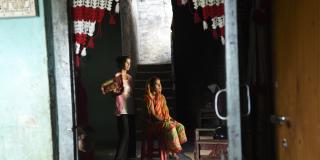
The coronavirus pandemic has devastated so many lives. But it isn't just one pandemic – from plummeting mental health to escalating gender-based violence – the most vulnerable in society are living through multiple invisible crises all at once.
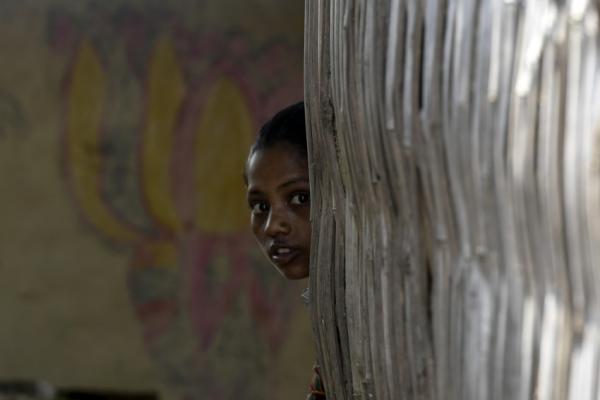
You’ll hear it all the time: the pandemic “affects us all”.
Some have even called it “the great leveller”, but it’s not true. The pandemic may have spread across the globe at a breath-taking rate and unprecedented scale, but its impact has certainly not been shared evenly among humanity.
How you experience the pandemic depends entirely on your “pre-existing conditions” – that includes health conditions, but also social, economic and environmental conditions. Everything from your gender to your job to your living conditions affects your risk from the virus itself, as well as your ability to weather the impact of struggling health services, soaring inequalities and a crumbling economy.
It’s what some scientists call a “syndemic”. It means that if we want to fully understand the impact, we have to look beyond just the virus, and more closely at the cracks it reveals in our society.1
Poverty as a pre-existing condition
The COVID-19 syndemic is built on a bedrock of poverty and inequality and, as is so often the case, it's those with the least who stand to lose the most. For the communities VSO works with, the coronavirus pandemic has been accompanied by many “shadow pandemics” – such as an alarming increase in gender-based violence and a collapsing informal economy.
The pandemic intersects every part of our lives and our communities, and disproportionately impacts the people VSO works with – which means our responses must do the same.
The pandemic gender gap
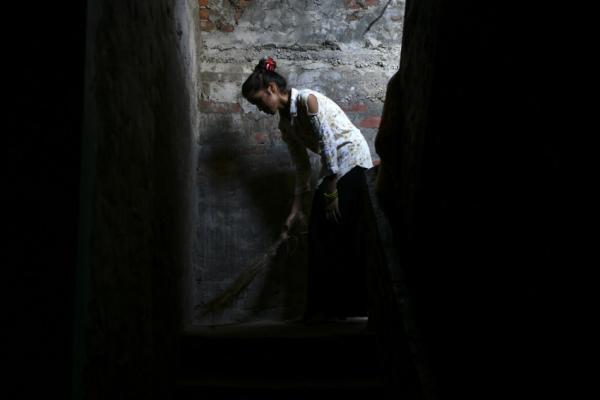
Even pre-pandemic, women around the world shouldered the greater burden of unpaid caring and domestic duties. Globally, women perform 76.2% of unpaid care work2, which is more than three times as much as men3 – and in poor and marginalised communities, where traditional gender roles can play a more dominant role in society, this is multiplied many times over.
During the pandemic, gender norms around caring responsibilities not only place additional pressures on women’s time, but also carry increased risks to their health. For example, women and girls are much more likely to be responsible for collecting water, shopping in markets and caring for sick and elderly people – all exposing them to greater risk of catching the virus.
In addition to unpaid work, globally, women make up 70% of the health and social care workforce and are more likely to be in frontline healthcare roles4, which dramatically increases the risks to their health.
Girls disappearing from the world's classrooms
With 1.5 billion children out of school, additional childcare and domestic responsibilities disproportionately fall to women, and many of the girls who have been taken out of school will be expected to shoulder these burdens too.
This dramatically increases the risk that they may never return to education even after schools reopen and increases their exposure to gender-based violence, female genital mutilation and early marriage, pregnancy and childbirth.
Though it’s still too early to grasp the true scale of the impact, the UN predicted last year that the pandemic could result in 13 million additional child marriages between 2020 and 2030, with its significant impact on girls’ education and sexual and reproductive health5.
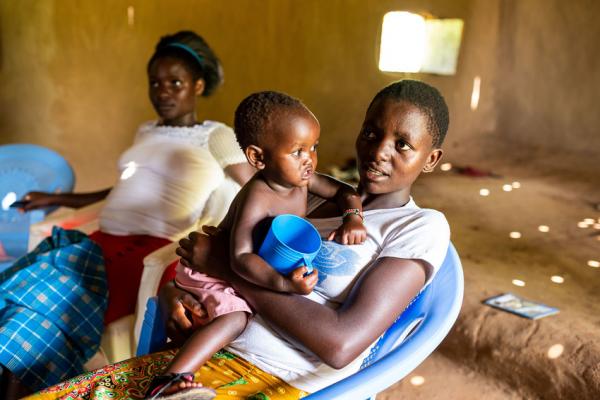
VSO volunteers are working in their communities to help ensure girls keep up with their education and get back to school – like the Sisters for Sisters project in Nepal where women mentor girls and their families in their community, supporting them and encouraging them to attend school. And for girls who weren’t able to go back, projects like Education For Life offer a second chance at specialised catch-up centres, where they can get the education and life skills they need to build a better future.
Gender-based violence soaring in lockdown
Gender-based violence has been called a “shadow pandemic” by the UN. As the virus tore through communities, people were told to stay at home for their own safety – but for many people across the globe, home isn’t a safe place.
Although, just as in pre-pandemic times, the very nature of gender-based violence makes it difficult to gather data, the trend seems to be that reports of domestic violence have increased by an average of 30%6 7 around the world – and this includes harmful practices such as forced marriage and female genital mutilation in many of the countries where VSO works.
The pandemic is likely to cause a one-third reduction in progress towards ending gender-based violence by 2030 and every three months of lockdown is expected to result in an additional 15 million cases of gender-based violence worldwide8.
Struggling support services
These increases in gender-based violence are occurring while – or perhaps because – support systems are being weakened by the pandemic. Health services have been stretched to breaking point, taking resources away from clinical and emergency services that, for example, support women who have experienced violence or sexual assault.
At the same time, some domestic abuse helplines and shelters have actually seen a decrease in calls9, despite the rise in cases. In situations where women are effectively locked in with their abusers 24 hours a day, opportunities to safely reach out for help are few and far between.
And where these official support services are already weak or non-existent, social distancing restrictions also cut off access to informal support networks such as friends, family or community leaders.
As part of our pandemic response, VSO has been training volunteers and frontline workers to provide mentoring, psychosocial support and information to survivors of gender-based violence. Volunteers have been working with communities to raise awareness for gender-based violence and helping survivors to access medical, legal and psychosocial support during the pandemic
Risking your life for your livelihood
For people whose livelihoods have been devastated by coronavirus restrictions, the two major difficulties they face are keeping themselves protected from the virus and finding ways to earn a living during lockdown. For some, staying at home and not working is simply not an option.
These challenges are especially difficult for women, who are significantly over-represented in the informal economy. With restrictions on activities like open air markets, domestic paid work and even small-scale, home-based trade, earning enough money to buy even basic food and hygiene supplies is especially challenging for female-headed households.
Rising food insecurity
The combination of economic hardship, restrictions on movements, increasing unemployment and worsening health mean that many are struggling to access one of life’s most basic needs – food.
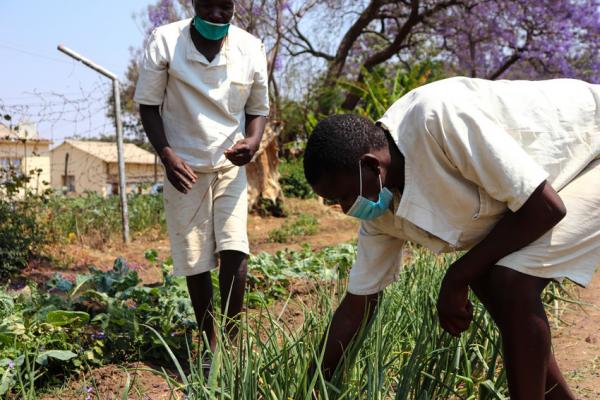
In VSO’s own research, communities cited food shortages and the related stress as major challenges due to the pandemic. For example, 58% of participants in Malawi indicated that they had no food due to a lack of income. Some even reported having to eat unhygienic (e.g. spoiled or discarded) food to get by, and where people still had access to basic food from local markets, prices had increased.
As well as distributing vital food and hygiene supplies to help people feed their famlies and protect themselves at work, VSO volunteers have also been training people to produce their own, which they can sell to earn a living and help their community stay safe.
Prison populations at risk
One section of society particularly at risk are prison populations in countries like Zimbabwe. Here, social stigma and exclusion, overcrowding and under-investment lead to poor nutrition, limited rehabilitation and high rates of diseases such as HIV and tuberculosis.
With these pre-existing conditions, prison inmates are at high risk of devastating coronavirus outbreaks, especially those with already compromised immune systems. The ban on visitors also means that the psychological support and supplementary food and medicines brought by relatives or organisations stopped, risking malnutrition and deteriorating mental health.
VSO uses traning and peer education in prisons to improve the health rights and dignity of (often forgotten) inmate populations in Eswatini, Zambia and Zimbabwe. As the pandemic swept the world, the projects focused on raising awareness of the virus and providing protective supplies. Many also improve nutrition while keeping up momentum on rehabilitation – such as in Zimbabwe, where VSO provided training for inmates in growing their own food to supplement a healthy diet and build practical skills for life after prison.
Isolated and excluded
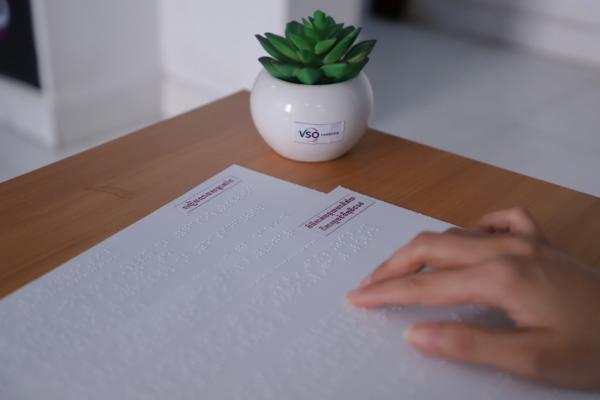
The World Health Organization estimates that the COVID-19 pandemic has disrupted or completely halted critical mental health services in 93% of countries10. This is during a time when the need is greater than ever; the pandemic has brought increased stress, isolation, bereavement and trauma – not to mention the neurological and psychological impacts of the virus itself.
In countries with already poor mental health provision, the effect is even more pronounced. For example, VSO’s research in Malawi revealed that 84% of people indicated living in stressful/traumatic conditions due to the pandemic. For people with disabilities, 45.7% said they felt extra mental pressures and felt isolated because they could not go outside.
Dwindling disability services
Disabled people already face huge barriers to accessing healthcare – especially women and girls in countries with already poor health services. Not only do many disabled people require additional and specialist services, the costs, limited availability and physical barriers to accessing these mean some of the most vulnerable are not receiving the care they need, and many are isolated and excluded from society.
Not only that, but prejudice and misconceptions mean that disabled people are more likely to be abused or neglected by healthcare workers, communities and their own families. Add to this the communication barriers many disabled people also face – for example, lack of sign language provision or disabled children not being allowed to attend school.
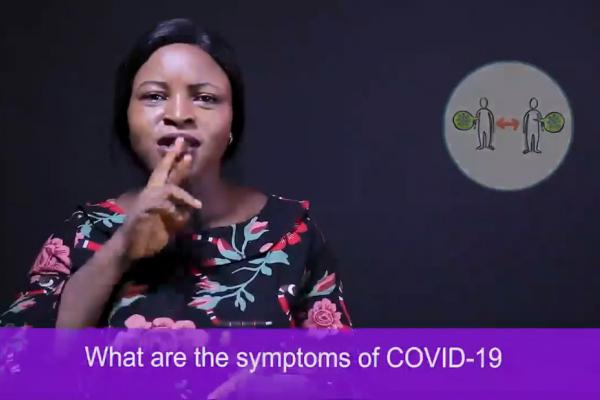
The pressures on health services during the pandemic have only served to increase this disparity. With so many health services redirected to tackle the virus, the already limited support for people with disabilities has disappeared.
Communication barriers
Many disabled people also struggle to find out how to keep themselves safe. Whether that's because they require formats like sign language or braille, have a physical disability that prevents them from accessing information, or struggle to understand and communicate their needs due to an intellectual disability. Additionally, disabled people who are denied an education due to stigma may not be able to read written materials about the pandemic.
Throughout the pandemic, VSO volunteers have been sharing vital information about the virus in ways that will reach even the most isolated and marginalised communities – such as by translating official government guidance into sign language, braille and local dialects, using radio broadcasts, leaflets and even community performances to distribute health messages. This work has included reaching out to people with disabilities to ensure they’re aware of their health needs and rights.
Building back better
The pandemic changed the world in less than two years, and the most excluded and most vulnerable people are the ones facing its most devastating consequences.
But the virus didn’t cause this, it just shone a spotlight on it. The inequalities and injustices existed before the pandemic, and will continue to affect the poorest and most marginalised people long after – unless we fight to build back better.
The last two years shows us just how different the world can look, but we want the lasting difference to be a fair world for everyone. Whatever comes next, the tireless dedication of VSO volunteers, and the supporters who make it possible, can help ensure that no one is left behind by this crisis – or the next.
When you support VSO, you’re helping make that lasting difference. Just £10 a month could help a family grow enough food to make a secure living – and help make an uncertain and unfair future a thing of the past.
Donate now to make a lasting difference
[1] Di Guardo, G. “COVID-19, a ‘syndemic’ rather than a ‘pandemic’ disease.” (2020).
[2] United Nations Women. “From Insights to Action: Gender Equality in the Wake of COVID-19.” (2020).
[3] ILO. “Care Work and Care Jobs for the Future of Decent Work.” (2018).
[4] Boniol, M. et al. (2019). “Gender equity in the health workforce: analysis of 104 countries. Working paper 1”. (WHO, 2019).
[5] UNFPA. “Millions more cases of violence, child marriage, female genital mutilation, unintended pregnancy expected due to the COVID-19 pandemic.” (2020).
[6] Muraya, K. “Gender and COVID-19 in Africa.” (2020).
[7] UN Women. “COVID-19 and Violence Against Women and Girls: Addressing the Shadow Pandemic.” (2020).
[8] UNFPA. “Impact of the COVID-19 Pandemic on Family Planning and Ending Gender-based Violence, Female Genital Mutilation and Child Marriage.” (2020).
[9] EENA. “COVID-19: impact on mental health and domestic abuse helplines” (2020)
[10] WHO. “COVID-19 disrupting mental health services in most countries, WHO survey.” (2020).
Read more
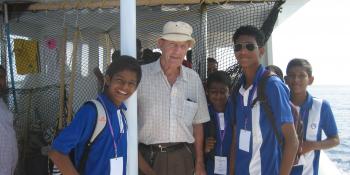
Transforming lives through education: Geoffrey’s VSO legacy
With a deep belief in the transformative power of education, Geoffrey from Norfolk, UK, has devoted his life both in the UK and abroad to making education more accessible for all.
